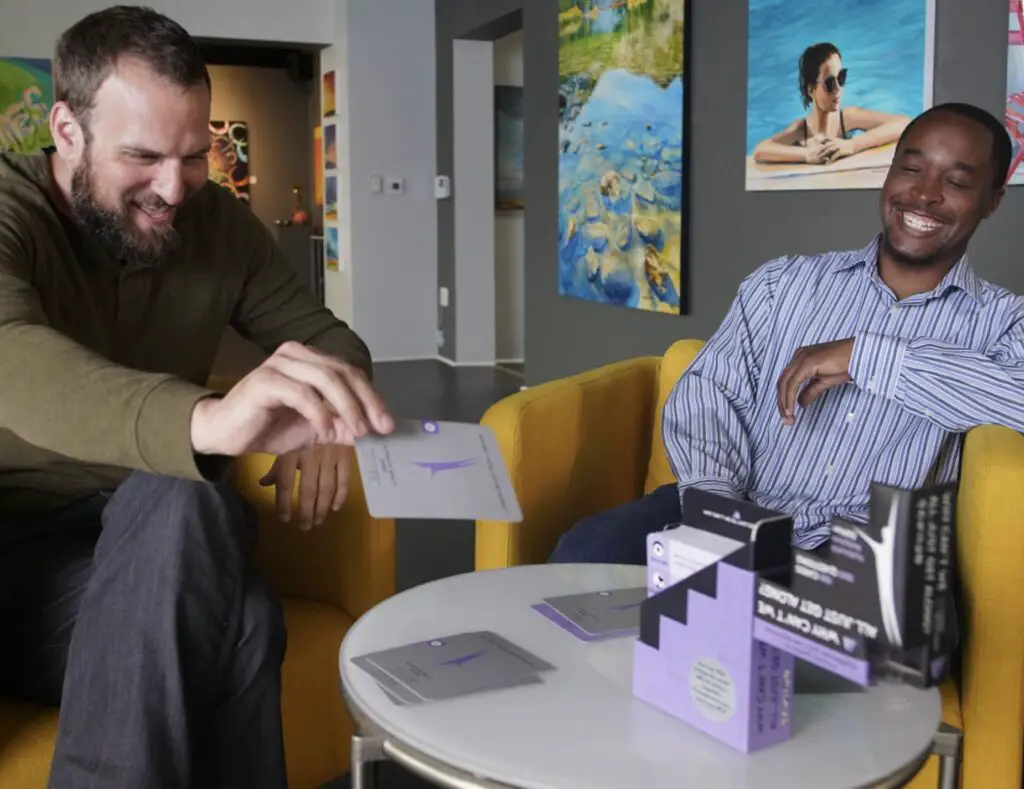
As an avid board game player, I love the strategic aspects of playing and competing (truth is I love winning, too). Because of this, when “Why can’t we all just get along?” came in for review, I jumped at the chance. This card game is the sequel to “How do you see the world?”.
Even though I enjoy competition, I was pleasantly surprised to see that this game doesn’t have a competitive edge. This isn’t a game you can “win” necessarily. It’s more of an ice-breaker game or a get-to-know-you-better game.
Here’s a sampling of the questions you will encounter…
- What is the best advice you have ever received?
- How can we trade anger for understanding?
- What if you were only known for the worst thing you have ever done?
- Name one person you love to work with, and why.
- How do you explore the world?
- What happens when life is not fair?
- How do you react when someone offends you?
You can play by yourself, with two people, or a group of any size. This game contains 100 cards with each card listing five questions in different categories: reflections, relationships, aspirations, life’s purpose, and beliefs. A six-sided dice with different symbols determines which question you answer — the sixth symbol is used as a “wild card” and the player who rolls that can pick any of the questions on their card.
(Warning… if you have a cat, keep the dice away! My little furball ran with it clenched in between his teeth and I had to chase after him.)
Every player gets a card. Someone rolls the dice, which determines the category, and reads their question out loud. All players answer that question. Once everyone answers, the round is over and everyone picks a new card (this wasn’t super apparent from the instructions).
Their website also provides different ways to play.
I played this game with one of my good friends. Hilariously, we actually played it wrong the first time. We only answered the question on our card and not the other player’s card, so we didn’t get to compare our answers…whoops.
As someone who loves digging into the deeper facets of human nature, I really enjoyed this game. In larger groups, it’s cool to see the thread of similarity between people even among differing points of view. For example, religious beliefs could differ between players, but the answers they give to certain questions may be very similar.
Cathy Cranberg, the founder and creator of this card game, says on the Authentic Agility website, “Seeing others share their experiences is a beautiful thing. The true magic happens when you allow yourself the freedom to learn from one another.” I think we tend to be more judgemental of people who have different opinions, but playing this card game gives us the opportunity to have an open discussion about those different viewpoints.
This game is a good choice to play with your friends, family, co-workers, or even a group of new people you want to get to know better.
Widely different worldviews and strong opinions can make this game quite intense. Think of the topics you usually avoid during family get-togethers – e.g. politics and religion. This game tackles these topics head-on with questions like: “Why do you vote the way you do?” and “When do you believe human life begins?”
So, “Why can’t we all just get along?” A simple question with no easy answer. I will definitely play this game again and highly recommend you try it out.
My only advice — be careful who you play with!
